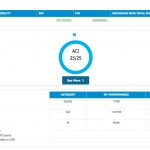 Editor’s note: ACR on Air, the official podcast of the ACR, dives into topics important to the rheumatology community, such as the latest research, solutions for practice management issues, legislative policies, patient care and more. Twice a month, host Jonathan Hausmann, MD, a pediatric and adult rheumatologist in Boston, interviews healthcare professionals and clinicians on the rheumatology front lines. In a series for The Rheumatologist, we provide highlights from these relevant conversations. The following article focuses on an episode about value-based care and how it impacts the rheumatology profession. Listen to the podcast online at https://acronair.org, or download and subscribe to ACR on Air wherever you get your podcasts. Here we highlight episode 3, “Value-Based Care in Rheumatology,” which aired Sept. 17, 2019.
Editor’s note: ACR on Air, the official podcast of the ACR, dives into topics important to the rheumatology community, such as the latest research, solutions for practice management issues, legislative policies, patient care and more. Twice a month, host Jonathan Hausmann, MD, a pediatric and adult rheumatologist in Boston, interviews healthcare professionals and clinicians on the rheumatology front lines. In a series for The Rheumatologist, we provide highlights from these relevant conversations. The following article focuses on an episode about value-based care and how it impacts the rheumatology profession. Listen to the podcast online at https://acronair.org, or download and subscribe to ACR on Air wherever you get your podcasts. Here we highlight episode 3, “Value-Based Care in Rheumatology,” which aired Sept. 17, 2019.
Is today’s healthcare system broken? That’s a question that Colin C. Edgerton, MD, Articularis Healthcare Group, Charleston, S.C., and Angus B. Worthing, MD, FACP, FACR, a partner with Arthritis & Rheumatism Associates, Washington, D.C. pondered during an episode of the ACR on Air podcast with host Jonathan Hausmann, MD. Dr. Edgerton is a former chair of the ACR Committee in Rheumatologic Care, and Dr. Worthing is a former chair of the ACR Government Affairs Committee.
Healthcare priorities are not aligned well, and the current focus on volume-based payments clashes with a rheumatologist’s preferred focus on quality care. “It’s the way we’re trained almost to a fault—being somewhat blind to the cost and reimbursement environment,” Dr. Edgerton says.
Often, rheumatologists struggle with the cost of treatments for patients, including biologic agents, which can cost thousands of dollars per month. “We’ve got to figure out some solutions,” he says.
Dr. Worthing noted the U.S. health system usually does what it needs to do to help patients get better, but it can feel broken when he prescribes a patient a breakthrough drug for autoimmune inflammatory diseases and sees them back for their next appointment. He gears up for a positive report from patients only to have them occasionally say they didn’t get the drug because they were in the Medicare Part D donut hole or similar cost concerns. He describes this experience as heartbreaking.
Another broken part of the healthcare system is the paperwork, with physicians and their staff drowning in prior authorization forms that slow patients’ access to treatment.
Dr. Hausmann shared his experience with a drug that may be beneficial for a patient but was not FDA approved for the requested indication. As a result, insurance companies refused to pay for the treatments even though it may be cheaper in the long run for them to cover the treatment and help the patient avoid side effects from other treatments or the long-term damage of the disease.
Value-Based Care
Drs Edgerton, Worthing and Hausmann addressed the roots of value-based care, including the use of the Sustainable Growth Rate (SGR), a formula for controling physician payment in the late 1990s that later failed.
After the SGR’s failure to rein in costs, “There was a big discrepancy between what the budget formula was going to be to pay for medical care and what the reality of increasing costs were,” Dr. Worthing says. “Congress constantly needed to find the money to plug the gap. The doctors and hospitals would continually lobby Congress to close that gap in order to keep the system going.”
That situation led to the development of the Merit-Based Incentive Payment System (MIPS), which is a modified value-based, fee-for-service system; or joining an alternative payment model (APM).
At Dr. Worthing’s clinic, patients are seen on a fee-for-service system, and Medicare patients are seen as part of MIPS. “We’re trying to make sure that what we do has value as that system defines it, making sure we have quantified rheumatoid arthritis [RA] disease activity,” Dr. Worthing says. This approach includes performing a Clinical Disease Activity Index and tracking and documenting osteoporosis screenings, among other things.
Dr. Edgerton shared his experience working with a value-based contract with the clinic’s major commercial insurer. “For patients with [RA], we have sort of an algorithmic pathway that’s laid out by which we ensure that we measure disease activity and track the use of different medications based on those disease activity scores so that decisions are made according to what the patient really needs,” he says.
Drs Edgerton and Worthing also addressed how they manage external costs under a value-based care model. Example: What happens to costs if a patient is sent for an MRI?
“You have to make sure that you’re not trying to control costs that really aren’t attributed to your care,” Dr. Edgerton says, pointing out that costs in RA are usually related to medication use. “What we’ve tried to avoid and done successfully with this contract is being held accountable for things like an emergency room visit.”
Get Involved
Rheumatologists have multiple options to become more involved with government affairs and initiatives related toward value-based care, according to Dr. Edgerton and Worthing. They can use the ACR’s RISE Registry to submit measures that need to be sent to Medicare.
Also, the ACR’s Legislative Action Center enables rheumatologists to stay current on advocacy efforts led by the ACR, Dr. Edgerton says. Through the Action Center, physicians can take part in federal campaigns and email pre-written letters to Congress. Examples: The ACR is currently conducting a campaign urging the Senate to modernize prior authorization in Medicare Advantage plans. Some other efforts to advocate for legislative solutions include such issues as workforce shortages, step therapy protocols, pharmacy benefit manager transparency and more.
Advocates for Arthritis is another event that lets rheumatologists connect with and educate their representatives on Capitol Hill. Held annually in September, rheumatologists can take part virtually or in person. This advocacy coincides with Rheumatic Disease Awareness Month, Dr. Worthing says. Those interested in the latest updates and alerts for next year’s event can sign up online.
For those with time and interest, the ACR also has many other volunteer opportunities, including its various committees. “If you can’t afford time to be on a committee, there are projects and work groups that need people’s input and, oftentimes, that can be done remotely,” Dr. Edgerton says.
Rheumatologists with questions about the government initiatives and regulations can reach out to the ACR by emailing [email protected].
Epilogue
Since the time of this podcast episode, interest in value-based payment models continues to grow, and organizations and practices continue to explore arrangements with payers and other approaches. As part of its Workforce Initiative, the ACR is working to evaluate and develop rheumatology-focused, value-based reimbursement programs for private payers that may be adopted by and benefit rheumatology practices.
Additionally, the ACR’s RISE Registry continues to assist rheumatologists with an easy and effective way to successfully comply with Quality Payment Program participation and federal reporting requirements. The RISE Registry supports rheumatologists and practices participating in MIPS and, new in 2023, MIPS Value Pathway (MVP) within the CMS’ Quality Payment Program. Both MIPS and MVPs require providers to be evaluated in four categories: quality, promoting interoperability, improvement activities and cost. The new MVP pathway reduces the number of measures required for submission with each category, but the scoring and payment outcomes remain the same as in the MIPS pathway.
RISE is an electronic health record-enabled rheumatology registry. With more than 1,000 rheumatology clinicians and 2.9 million patients, RISE plays an instrumental role in advancing the specialty through improving care and expanding research. To learn how to join RISE, contact ACR staff at [email protected].
Vanessa Caceres is a medical writer in Bradenton, Fla.
More Episodes
A new episode of ACR on Air comes out twice a month. Listen to this full episode and others online at acronair.org. Or download and subscribe wherever you get your podcasts.


